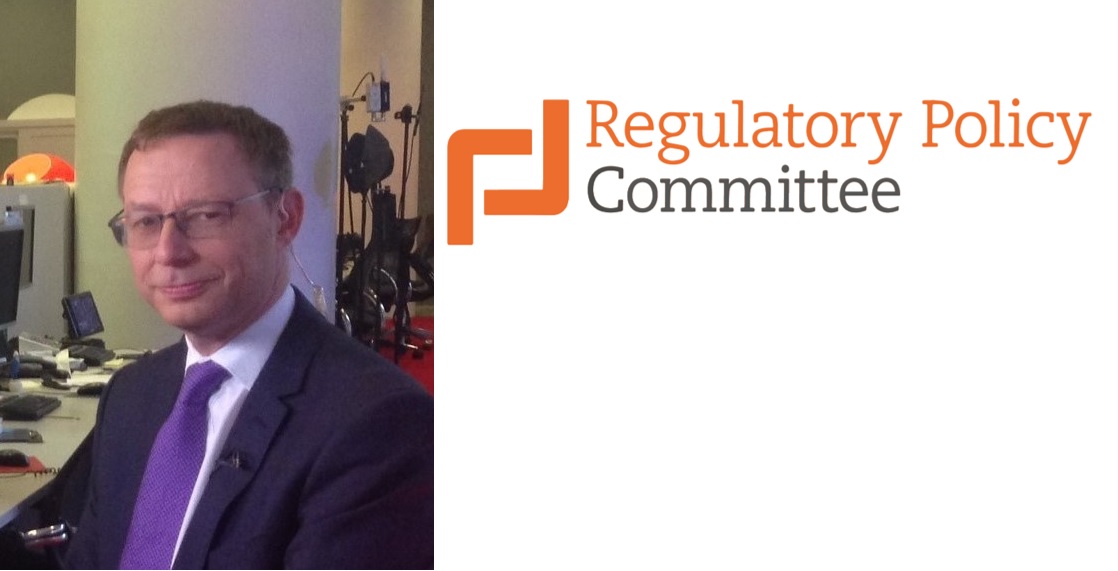The RPC is the independent regulatory scrutiny body for the UK Government. The Committee assesses the quality of evidence and analysis used to inform government regulatory proposals.
Stephen Gibson is a lecturer in microeconomics at Birkbeck University of London and a Senior Fellow at Harvard University, researching the regulatory framework used by government departments and sectoral regulators to introduce new regulations in the UK and how it could be more effective. He has worked as chief economist, senior advisor and analyst in a broad range of sectors and organisations and also runs an economic consultancy firm. Since 2019, Stephen has chaired the Regulatory Policy Committee, the UK equivalent to the Swedish Better Regulation Council. As the UK’s regulatory framework recently changed, including the removal of the Business Impact Target, scrutiny at an earlier stage and more focus on ex post evaluations, we asked Stephen to tell us more about this.
Could you please describe the Regulatory Policy Committee?
The RPC is the independent regulatory scrutiny body for the UK Government. The Committee assesses the quality of evidence and analysis used to inform government regulatory proposals, with the analysis and the RPC’s opinion accompanying legislation in Parliament. This independent advice and scrutiny helps to ensure that ministerial policy decisions are based on accurate evidence, and helps to produce better regulation.
The committee has eight members who are independent experts from a range of backgrounds, including the private and voluntary sectors, business, and academia. Collectively, the RPC has experience and knowledge of employee, consumer and economic issues and is supported by a secretariat made up of civil servants.
Our views are made available to ministers making decisions, to Parliament when scrutinising proposed legislation and to the public when they are published on our website. The RPC provides our views in the form of opinions issued in response to departments producing impact assessments (IAs), post implementation reviews (PIRs) and options assessments (OAs).
Which are the main components of the new Better Regulation Framework in the UK?
The new Framework shifts the RPC’s focus from IAs to OAs, so that analysis and scrutiny occurs earlier in the regulatory and legislative process. The old better regulation framework was built around verifying the economic impacts of regulation for the business impact target (BIT), but it meant that independent scrutiny came late in the policy development process – when there was limited scope to influence or improve regulation. It has also resulted in a narrow focus on direct costs to business, rather than a wider assessment of impacts on consumers or areas such as innovation and competition. The new Framework is also intended to have greater focus on evaluation of the effectiveness of regulations through more attention being paid to RPC scrutiny of Post Implementation Reviews.
Which are the changes for the role of RPC within the new framework?
The primary change is the shift from scrutinising IAs to OAs. The RPC is preparing for its new role ahead of the new Framework coming into force. We have begun to develop our approach to reviewing OAs in order to assist government departments in developing their regulatory proposals. We have also considered how we will monitor and report on the Government’s delivery of PIRs.
There was a period of transition until September 2024, as departments transferred to the new Framework. The RPC looks forward to working with colleagues across government to ensure that the new framework is introduced and operates as smoothly as possible. The RPC held an event in January 2024 for all its stakeholders to help embed the new Framework.
What are your thoughts of the new role of the RPC?
I welcome the new Framework which includes many of the changes that we have asked for. This includes independent scrutiny at an earlier stage in the policy development process to allow us to comment effectively on the evidence supporting the different policy options and consideration of a wider range of impacts (including the impacts on households and on the environment), rather than a narrow focus on direct business impacts. I am very much in favour of the renewed focus on monitoring and evaluation and a commitment for Post-Implementation Reviews to be carried out comprehensively.
The removal of the Business Impact Target (BIT) is a major change to the Framework. The BIT was introduced in 2015 as an attempt to reduce the cumulative costs of regulation on business. At the start of each parliament, the Government set a target for the total regulatory burden on business of new regulation over the life of that parliament and the RPC validated the Government’s estimates of regulatory costs, so that progress against the BIT could be reported each year.
However, as we have often commented, the BIT did not reduce regulatory costs in recent years (in fact they increased substantially) and the Government has failed to meet the targets it set itself. During the 2017-2019 parliament, the Government aimed to reduce regulatory costs by £9bn, in fact, those costs rose by £7.8bn; while in the 2019-2024 parliament, the Government set a holding target of no increase in regulatory costs, however costs increased by £14.3bn in the first three years. At the same time, important policy areas (that have had significant regulatory costs attached) were exempt and not included in the BIT figures. Perhaps most significantly, having a target (and missing it) appears to have had little consequence for decisions about regulation by ministers.
Any other matter(s) you think might be interesting for us to know?
The RPC enjoys working with our European colleagues in RegWatchEurope and we look forward to sharing our experiences of the new Framework as well as learning from their experiences. Please take a look at our website (gov.uk/rpc) and blog (blog.rpc.gov.uk) to find out more about our work.
Stephen Gibson
Chair
Regulatory Policy Committee

